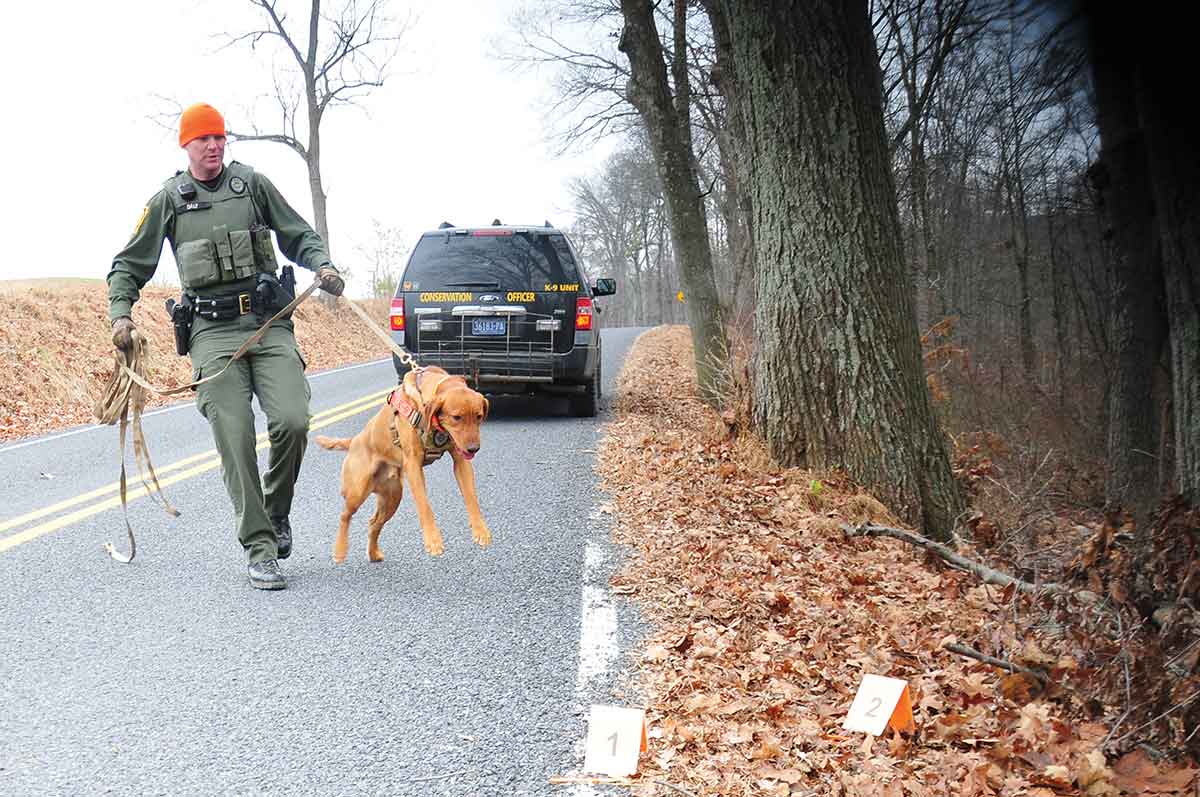
Game warden Derek Daly and his K9 dog, Gunner, look for evidence during a training session.
Photo: Pennsylvania Game Commission
They are not new, not even here.
Law enforcement officers have long used dogs – K9 companions – to help find evidence, track down criminals, recover lost people and more.
That’s been true on and off at the Pennsylvania Game Commission, too. Rich Palmer is deputy executive director for field operations for the agency and a master dog handler. He said at least one game warden was using a dog as early as 1950. That officers put a Weimaraner into service to nab poachers
“He was finding quail in hubcaps at road check points,” Palmer said.
The commission is now following that lead, in an even bigger way.
It’s not using dogs to find quail – there are none left in the state, at least for now — — but it is expanding its K9 program.
It has three game wardens paired up with dogs now. Each covers one third of the state.
Soon, it will have six.
“I don’t have any timeline for when they are planning to roll this out, or advertise for any of these positions or any of that. But the idea is that there would be one officer-dog pair for every region instead of one for every two regions,” said Travis Lau, communications director of the agency.
The commission got into the K9 dog game in a formal way in 2001, pairing two officers with dogs. They were assigned to specific districts, like all game wardens.
That didn’t work out so well, Palmer said.
It’s not that the dogs couldn’t or didn’t perform. Palmer said they did.
But putting them under the control of officers already tasked with a myriad of other duties limited their utilization.
So when those dogs aged out, and the commission replaced them with three new ones in 2014, those handlers and dog became their own unit. They’re considered special investigators.
As such, they are available to respond to calls across district boundaries much more quickly, Palmer said.
They are used in a variety of ways, both inside the commission and out. They’ve not only found spent shell casings and arrows used by poachers, but lost people and, in one case, the knife used in a murder. It had gone undiscovered in a patch of woods for two years when Pennsylvania State Police asked for help in finding it.
“They are a lot quicker than a metal detector,” Palmer said.
They’re valuable on the public relations front, too.
The dogs are popular with people, Palmer said. So the commission uses them at a lot of educational events.
“It’s a very good way for us to get in front of the public and talk about our mission,” he said.
There’s one problem with the K9 program as it exists now, though. And that’s what is behind its expansion.
While more and more game wardens and outside police officers are calling on the digs, they aren’t always willing to wait too long for them to arrive. Not if a case is hot.
“If they have to wait four or five hours for someone to get there, they’re not going to wait. That’s pretty much any law enforcement,” Palmer said.
So expanding the program by another three dogs should cut down on wait times, he added. That will likely lead to even more utilization and better protection for protecting the state’s natural resources.
“We’ve had a great deal of success with these dogs,” Palmer said.
Choosing and training K9 dogs
The Pennsylvania Game Commission’s three existing K9 dogs – Storm, Gunner and Skye – are all Labrador retrievers. Its next three will be, too.
There are three reasons for that, said the agency’s Rich Palmer.
First, they’re very trainable. Second, they’re fairly comfortable around other dogs. And third, they’re familiar to hunters.
“So they’re much more accepted when the handlers are in the field dealing with hunters or working on a job,” Palmer said.
And they’re smart.
Handlers train them using different commands and collars. The dogs learn to differentiate, say, an article search from a tracking case by the collar they feel and command they hear, Palmer said. Those clues also tell them whether to sit down beside or lay on top of whatever they find, he added.
That intelligence is why he jokes with game wardens the way he does.
“The handler’s number one thing, and they’ve heard me say it a thousand times, is trust your dog. They’re smarter than you,” Palmer said.
MORE FROM EVERYBODY ADVENTURES
See also: Blood tracking dogs come to Pennsylvania
Follow us on Facebook, Twitter and Instagram.








